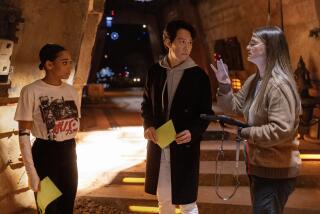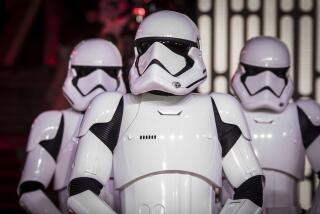From the Archives: ‘Insurrection,’ though not as strong as the last ‘Star Trek’ film, keeps the franchise flying
- Share via
No disrespect intended to the proud Son’a people but, hey, where are the Borg when you need them?
It was the terrifying and thoroughly alien Borg who made the last “Star Trek” film, “First Contact,” one of the best in the series’ 19-year theatrical history. The latest and ninth installment in that line, “Star Trek: Insurrection,” lacks the adrenalized oomph of its predecessor, but no adventure of the Starship Enterprise is without its gee-whiz affability.
These intergalactic films are one of the few constants in today’s movie universe, a reliable brand name that guarantees that the proceedings won’t sink irredeemably below an acceptable level of Saturday matinee diversion.
Part of the reason for this is the way the true believers who create the “Star Trek” films have morphed into a kind of self-perpetuating oligarchy, involved not only with feature films but with the growing handful of TV series that bear the “Trek” trademark.
“Insurrection” director Jonathan Frakes, for instance, co-stars as Cmdr. William Riker on the big screen and has worked on the series “Star Trek: The Next Generation,” “Star Trek: Deep Space Nine” and “Star Trek: Voyager.” The same goes for screenwriter Michael Pillar and producer and co-story creator Rick Berman. If the Federation isn’t in your blood, you don’t get a turn at the bridge.
Every “Star Trek” starts with a puzzling incident, and “Insurrection” has the cheerful android Data (Brent Spiner), the “Next Generation’s” Spock surrogate, surprising everyone by turning hostile. That’s serious enough to cause his mentor and commanding officer, Capt. Jean-Luc Picard (Patrick Stewart), to change plans and investigate.
Data has been attached to a cultural survey team, a joint venture between the Federation and those sinister Son’a, to monitor the life of the bucolic Ba’ku people. Two more different races it wouldn’t be possible to imagine.
The Son’a, led by the mysterious Ru’afo (F. Murray Abraham), are such an ancient and decrepit people that you almost expect their arms to fall off when they move them. Determined to look as young as possible, they indulge in so much face-stretching plastic surgery they resemble Men From Glad, their visages swathed in miles of plastic wrap.
The Ba’ku colony, on the other hand, is the idyllic dream utopia of every 1960s hippie’s fantasy. It’s an outer space commune where comely children play in the fields, handsome men are kindly and considerate and women wear long skirts and make bread with smiles on their lovely faces.
When hard-driving Picard arrives here in search of Data (the android, not the information), he discovers that the Ba’ku are not entirely what they seem. New Agers to the core, they do insist on living in the moment, but it’s not because they can’t cut it technologically. After all, as one of their leaders puts it in typical philosophical “Trek”-ese, “where can warp drive take us but away from here?”
Helping Picard understand these seeming children of nature is a romantic interlude (we’re talking hand-holding, if you must know) he has with the beautiful, mysterious Anij (Donna Murphy). “A single moment in time,” she tells him, “can be a universe in itself.” The captain’s log was never like this.
Why, Picard wonders, would anyone be causing trouble for these sweet-natured innocents? And, when it comes to that, why are the sinister Son’a hanging around the place in the company of Federation Adm. Dougherty (Anthony Zerbe)? Is a betrayal of the Federation’s sacred Prime Directive in the offing?
Helping Picard unravel these mysteries is the usual “Star Trek” crew, including Geordi of the electronic eyes (LeVar Burton), Worf the tame Klingon (Michael Dorn), the medically minded Dr. Beverly Crusher (Gates McFadden) and the half-Betazoid counselor Deanna Troi (Marina Sirtis).
Also back are the usual bursts of clunky dialogue and cliched situations that echo the old days of Buck Rogers serials more than may be intended. What would a “Star Trek” be without scientific observations like “The metaphasic radiation is in a state of extreme flux” and questions on the order of “When was the last time we aligned the torque sensors?”? Like the series, itself, it’s been awhile, but who’s counting?
More to Read
Only good movies
Get the Indie Focus newsletter, Mark Olsen's weekly guide to the world of cinema.
You may occasionally receive promotional content from the Los Angeles Times.











